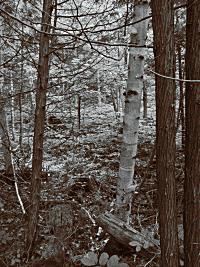|
July 13, 2016
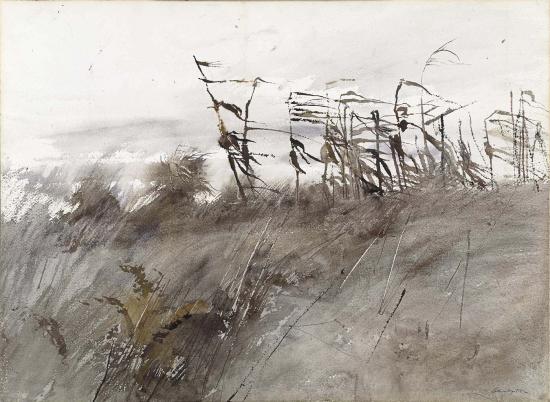
Andrew Wyeth
b. July 12, 1917
_______________________
Among
David Hollander
conjunctions
But Max didn’t sail back through a day and a night. He didn’t return across a tumbling sea. His dinner wasn’t still warm. None of that is true.
There are places hidden in the seams of the world. In the lacuna between “I love you” and “Please leave.” In the breath between the whiskey and the rage. No one had cooked a meal in months. Cobwebs gathered in corners, gossamer and evil. The glint of his father’s brass ring in the dying light of October bespoke a form of destitution that the young boy felt in the hollows of his bones. His mother’s nails tapped on dishes and counters, filling the time-holes between cigarettes. Yellow smoke curling. Tap tap tap. Countdown to detonation.
She called him wild thing. But of all the breathing things in that domestic experiment he was the least wild. Hiding in closets, concealed among fanciful garments his parents would never again wear, the mothball-fumes stinging his tender flesh. Kneeling on the cold and fissured concrete of their front yard and imagining the lives of ants as they descended into their dark, unknowable canyons. Blind, stupid lives unstained by fear. He sometimes felt as if his heart were a colander straining heavy black cream. The wolf suit? Among monsters one becomes a monster, or perishes.
You might find a seam. You might slip inside its lush turquoise interior. But a return ticket? The rocky shores of the fourth world receive but do not deliver.
His little boat awash on the waves in the center of the Nothing, and then suddenly the island materializing from silver smoke and sea foam. The beach rising up not from a distance but all at once. On its coarse pink sand they waited. Flashing their terrible claws. Gnashing their terrible teeth. Rolling their terrible eyes. But wild in name only, the boy could see that plainly enough.
...(more)
_______________________
In Piam Memoriam
Geoffrey Hill
1932 - 2016
1
Created purely from glass the saint stands,
Exposing his gifted quite empty hands
Like a conjurer about to begin,
A righteous man begging of righteous men.
2
In the sun lily-and-gold-coloured,
Filtering the cruder light, he has endured,
A feature for our regard; and will keep;
Of worldly purity the stained archetype.
3
The scummed pond twitches. The great holly-tree,
Emptied and shut, blows clear of wasting snow,
The common, puddled substance: beneath,
Like a revealed mineral, a new earth.
_______________________
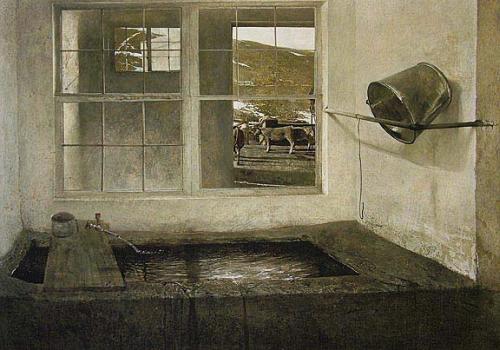
Andrew Wyeth
_______________________
verses from Oraclau/Oracles by Geoffrey Hill
44: Welsh apotheosis (IX)
Fantastic logic found unreason here –
Russell’s North Wales, Betws, Portmeirion.
Who now would thrust inquiry on
Beyond necessity of desire?
I would be named: so pledge
Me, language you old reprobate, my rage
Your own eccentric loves drawn from the edge;
Transfigure my proclaimed ineptitude:
Twice-born that virgin bridegroom and his bride.
...(more)
_______________________
Beware the ‘empathy-washing’ of self-proclaimed caring capitalists
Evgeny Morozov
(....)
... In reality, the technological euphoria spawned by the refugee crisis suggests that we update the list of clever co-optation efforts that arise from compassionate capitalism –from “greenwashing” for fake ecological commitments to “openwashing” for fake transparency pledges – with yet another term: “empathy-washing”. It seems apt to describe growing corporate efforts to hijack humanitarian crises in order to tout corporate commitment to humanitarianism.
Empathy-washing initiatives create the false impression that the crisis is under control, with individual ingenuity, finally unlocked by privatised technologies, compensating for the rapidly deteriorating situation on the ground. And even if some of them do temporarily relieve the effects of the crises – against their causes, privatised technological solutions are impotent – they also entrench the power of technology platforms as indispensable intermediaries essential to the smooth administration of the post-crisis political landscape.
(....)
In the future – which, somehow, increasingly looks like our feudalist past – to be truly free, we’ll first have to pledge allegiance to a giant technology provider. Should our corporate overlord “pivot” to a new business model or simply decide that our freedom can no longer be justified in its cost-benefit analysis, we’ll have to find some other private guarantor of freedom.
Fleeing from the effects of neoliberal capitalism, all of us are becoming permanent refugees – with technology giants occasionally taking pity on us by offering us free services, identity papers, and an opportunity to make money in the sharing economy. And, soon, there won’t be anywhere to flee.
...(more)
_______________________
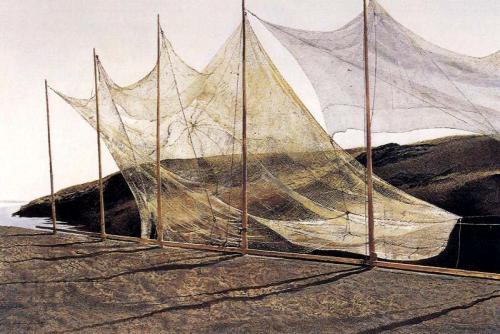
Andrew Wyeth
_______________________
The impossibility of precarity
Francesco Di Bernardo
... precarity is not a new condition determined by transformations of labour brought about by technological innovations; it is the result of political initiatives aimed at the creation of hegemony of the capitalist elites and class domination.
_______________________
As the veneer of democracy starts to fade…
McKenzie Wark
(....)
Virno takes three approaches to the multitude, the first of which is from the point of view of fear and anguish. Security from fear is in the hands of a community; security from anguish can only be the province of a religion. Fear is relative, but anguish is absolute. But the divide between them has eroded. The state no longer provides comfort from dread. The unity of a people is bounded by fear and a state can secure them against that fear. The multitude lacks this division between an inside and an outside. The multitude is never at home, is always a stranger, even if there remains a “dangerous search for protection.”
The multitude has its home in the commonplaces of language, such as the rhetorical figures of more-and-less, of opposites, or of reciprocity. The special places of discourse are perishing, leaving only the commonplaces. The feeling of homelessness and reliance on commonplaces go together. We are now always exposed to the world in its totality. We are all strangers.
(....)
... under wage-labor, nihilism has entered production. It is no longer a question of modernization producing rootlessness, contingency, uncertainty, anomie as side effects of a rational core. Rather, productive activity uses those very effects as resources. “Nihilism, once hidden in the shadow of technical-productive power, becomes a fundamental ingredient of that power, a quality highly prized by the marketplace of labor.” The result is the affective prevalence of opportunism and cynicism. The post-Fordist worker moves from one thing to another; negotiating rules of the game, responding to rules not facts. Money makes these things equivalent; the general intellect is always something else. It is a qualitative potential that forms the basis of all production.
...(more)
July 11, 2016
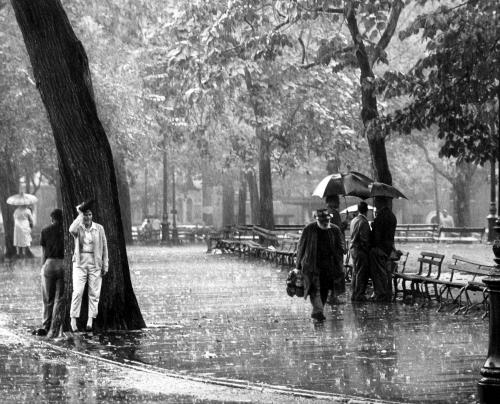
Dave Heath
1931 - 2016
1 2
_______________________
Sailing Along
William Hawkins
The dark night
on Bedque Bay—no
fireflies nor raccoons
(visually or audibly)
to accompany the
lonely vigil
of this twisted perceiver who channels
hummingbirds-- not
creatures of the night
at all.
Ecumenical failure
from an atheist.
Lower Bedque, PEI.
William Hawkins (1940-2016)
Cameron Anstee
The Collected Poems of William Hawkins
edited by Cameron Anstee
Chaudiere Books
William Hawkins: a Unique Voice in Canadian Poetry
Roy MacSkimming
rob mclennan on William Hawkins
Bruce Cockburn and Sneezy Waters remember poet William Hawkins
cbc
_______________________
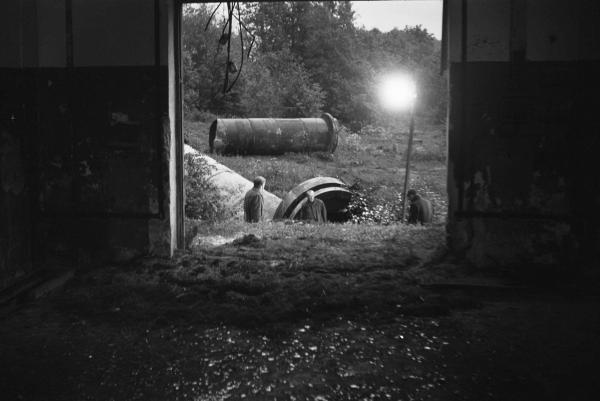 photo by Sergei Bessmertniy
A unique perspective on the making of ‘stalker’:
the testimony of a mechanic toiling away under Tarkovsky’s guidance
Sergei Bessmertniy
_______________________
A Translation of "Das Armenhaus von St. Laurin"
a Short Story by Thomas Bernhard
translated by Douglas Robertson
The Poorhouse of St. Laurin
(....)
Most of the old people here were like wizened trees that bowed under the force of tempestuous winds and refused to accept that someday soon they were going to be snapped off like mere kindling-twigs and burnt to ashes. They tried harder and harder to stoop slowly and equably in the hope of finally reaching that brilliantly scintillating water of purity that they had thirsted for since the first day of their lives. And in the evenings they would sit on the benches in front of the St. Laurin poorhouse, and their old heads were white like the crowns of the young cherry trees when the sun shone on them...
...(more)
_______________________
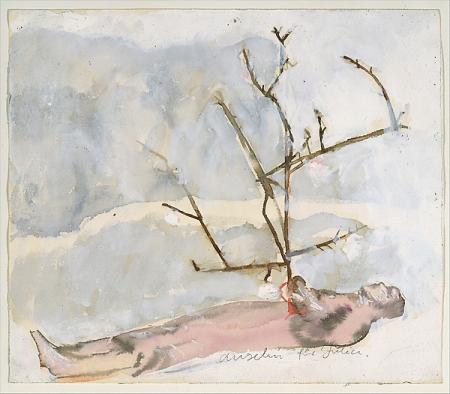
Man Lying with Branch
Anselm Kiefer
1971
_______________________
The Intellectual Imagination: An Interview With Susan Sontag
(....)
CJPST: In l, etcetera one character says “My skull is crammed with quotations” and another says “We are ruled by quotations”. Do you have a particular strategy for using quotations in your work?
Sontag: What seems distinctively modern as a unit of thought, of art, of discourse is the fragment; and the quotation is one kind of fragment. I became aware, after the fact, that I was fascinated by quotations and lists. And then I noticed that other people were fascinated by quotations and lists: people as different as Borges and Walter Benjamin, Novalis and Godard. Using quotations was at first quite spontaneous for me, but then this use became strengthened through reflection. But originally this practice came out of temperament. I agree with Nietzsche and Oscar Wilde that ultimately ideas come out of a temperament or a sensibility, that they are a crystallization or a precipitation of temperament. It’s not that you make up your ideas to justify your temperament but that it’s the temperament first. In the late essays collected in Under the Sign of Saturn I ended up writing portraits which seemed like assessments of the body of a work but are in fact portraits of temperaments that express themselves in art. I’m interested in the possibility of fiction which straddles narrative and essay. A novel is a “baggy monster”, as Henry James said. You can include essay elements in fiction; this is a very nineteenth century practice. Balzac will stop to describe the sociology of a place or profession; Tolstoy will talk about ideas of history. That notion of including essay elements is very familiar, but there are more seductive modern examples: Central European novelists, like Broch.
...(more)
June 20, 2016
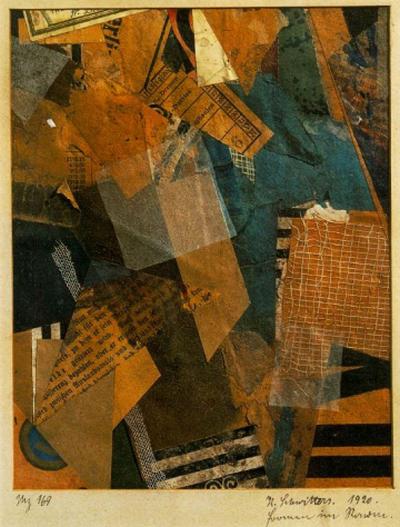
Forms in Space
Kurt Schwitters
1920
_______________________
What We Remembered Before
Amish Trivedi
from "FuturePanic"
presented by Jerome Rothenberg
(....)
As a memory
just as it was done before
clearings came. Another sensation that
comes in when otherness vacates. A descent
and catching the hands in an escape
pose, bringing brickarms
to spin into another form so
brilliant the eyes retract into
their holster. Rearranged
to form new compounds
built on the generations
of freedom we
rebelled from,
the glass lip tasted
but prevented from
blistering under a
skin we've already
known. The next
year is always easier
than this one but I
realize I'm expected
to speak in projections
that never seem
to clear the teeth
utterly.
...(more)
_______________________
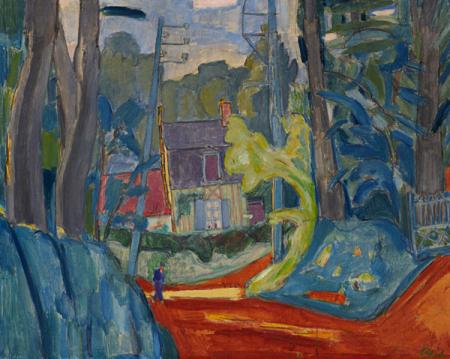
House in Normandy
1939
Martin Bloch
d. June 19, 1954
_______________________
The Struggle Against Language
Scott Esposito
quarterly conversation
Respected, parodied, revered, despised, Karl Ove Knausgaard’s My Struggle has been with us for just four years. Few in the English-speaking world knew the Norwegian’s name in 2012, but in just four years he has come to seem so omnipresent that NYRB critic, author, and beloved contrarian Tim Parks recently chastised us against “the impression of [Knausgaard's] huge and inevitable success.”
There is some truth there. He has not sold in numbers that would put envy on J.K. Rowling’s face—there is a degree of hype—but with U.S. sales of the first four volumes of the series likely topping 200,000 copies, Knausgaard is certainly far more successful and better-known than all but a handful of authors of the last few years. And now that we have Book 5 the end is in sight; the method behind the entire cycle has at last come into view. It is time to take stock.
(....)
A major achievement of Book 5 is to make us feel the struggle against incessant failure that characterizes the life of all writers, a struggle that is most acute at the beginning of the writing life. This is where Knausgard’s capacity for humiliation, his inherent faculty with masochism, his very willful maximalism gives his account a texture that distinguishes it from other accounts of the young writer. The sheer weight of Karl Ove’s failures is monumental, but somehow it does not deaden the momentum of the narrative. Knausgaard transforms this incredible doubt into the site of his struggle to find a language; he wants to understand why he continues to write in spite of everything. At times the story takes us through relationships and occurrences that at first blush seem like sideshows to this tale. But they are not pointless digressions. Karl Ove is maturing, he is working through the issues that have held him back, even as he is seeding the preoccupations that will become the irresolvable dilemmas of his mature decades.
...(more)
_______________________
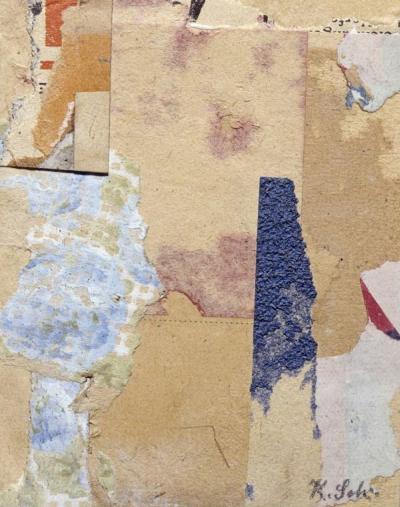
Aphorism
1923
Kurt Schwitters
b. June 20, 1887
_______________________
Between
Ágnes Nemes Nagy
Translated from the Hungarian by Hugh Maxton
(from Napforduló, 1967)
presented by flowerville
(....)
Between the day and the night.
Aches and stabbings,
visions, voiceless aqueducts,
inarticulate risings,
unbearable tension
of verticals between up and down.
Climates. Conditions.
Between. Stone. Tanktraces.
A strip of black reed rimming the plain
written in two lines, in the lake, the sky,
two black plaques of signsystem,
diacritic on the stars —
...(more)
|
